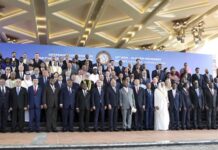China says it has developed next-generation hypersonic missiles with heat-seeking technology that may take the US military years to match.
The development has major implications for the countries’ arms race and comes four months after Beijing denied reports it had tested a nuclear-capable hypersonic missile that circled the planet, saying it was a spacecraft.
Now Chinese researchers from the National University of Defence Technology say they have developed technology that allows a hypersonic missile to search for, identify and lock on to a target based on its heat signature when flying at low altitudes where the air is thicker.
This means the hypersonic missiles could hone in on targets including stealth aircraft, aircraft carriers and moving vehicles on the street with unprecedented accuracy and speed, according to research cited by South China Morning Post.
Heat sensing at hypersonic speed is difficult because the pace of the missile itself generates heat that interferes with detection systems.
But China has made “a series of core technology breakthroughs that were proven effective in tests,” lead scientist Professor Yi Shihe wrote in a paper published earlier this month in the Chinese peer-reviewed journal Air and Space Defence.
The breakthroughs researchers achieved in infrared homing technology – including by developing a device that cools the surface of infrared windows, which normally would crack due to the high temperatures – could transform conventional warfare, the paper said.
The US uses high-speed infrared homing technology in missile defence systems such as the Terminal High Altitude Area Defence (THAAD) system, but these heat sensors work only in thin air at high altitudes, according to the Chinese researchers.
In February, the US Department of Defence asked various contractors to develop infrared sensors for hypersonic missiles, but their testing and development may take at least four years, according to their contracts, cited by South China Morning Post.
China and Russia have been testing hypersonic missiles since 2014 and 2016, respectively, while the US hopes to deploy its first by 2025.
US General Mark Milley, chairman of the Joint Chiefs of Staff, said earlier this year during an interview that China’s hypersonic test in August was close to a “Sputnik moment” for the US.
The Telegraph, UK.





